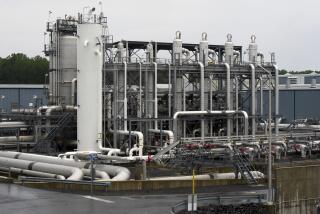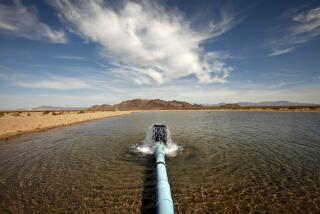U.S. Companies Eagerly Await Decision on Chinese Dam : Trade: Environmentalists are pressuring the Export-Import Bank to avoid participation in the controversial project.
Great athletes train for the Olympics. Attorneys fantasize about arguing a case before the Supreme Court. Robert F. Oury hopes to someday test his professional mettle on the granddaddy of hydroelectric projects, the proposed Three Gorges Dam on China’s Yangtze River.
But Oury, the president of Rotec Industries, a small Illinois-based concrete hauling firm, fears his dream to participate in China’s most ambitious industrial project will be shanghaied by environmental activists with a receptive ear or two in the White House.
He is just one of many U.S. exporters nervously waiting to see whether the U.S. Export-Import Bank will uphold the National Security Council’s recommendation to steer clear of the controversial project--or buck tradition and agree to help U.S. companies seeking a piece of the $30 billion project.
Three Gorges critics are equally eager, hoping the bank will hand them their biggest coup to date by raising its influential voice against a 17-year project that they argue will force a million people from their ancestral homes, submerge historic sites and threaten exotic wildlife like the Baiji (white fin) dolphin and the Chinese alligator.
Both sides portray the upcoming decision as a defining moment in the Clinton administration’s delicate balancing act between promoting U.S. economic interests and protecting the global environment and human rights.
The Export-Import Bank has promised an announcement by year-end, although the federal budget impasse could result in a delay. While the bank is an independent agency, it usually follows the White House lead.
“This is the acid test for export advocacy,” said William Lane, a lobbyist for Caterpillar Inc., the giant Illinois-based manufacturer, which estimates it could lose up to $200 million in sales if it is squeezed out of the giant Chinese dam project.
“The international financial institutions are having to meet a new standard that says if you’re going to support corporations, those corporations must be expected to protect the environment, respect human rights and respect workers’ rights,” said Andrea Durbin, director of international projects for the Washington office of Friends of the Earth.
While these concerns are not new, the stakes have expanded enormously with the growing internationalization of the U.S. economy. America’s traders depend on government lending agencies such as Export-Import and the Overseas Private Investment Corp. to finance high-risk ventures abroad, particularly in developing countries where cash-strapped governments expect foreign companies to provide financing to secure a deal.
However, their critics have become more sophisticated.
*
Sit-ins, consumer boycotts and candlelight vigils remain a popular form of protest for these 1960s’s-era organizations, whose members range from the giant Sierra Club and Friends of the Earth to the much smaller International Rivers Network of Berkeley.
They are now using their political savvy and overseas networks to put pressures on the corporate bottom line--by such familiar maneuvers as buying shares in targeted companies and lodging shareholder resolutions, advocating “socially responsible” investing, and threatening lawsuits.
But their most effective strategy of late has been to pressure government-backed lenders such as OPIC not to fund controversial projects.
These critics have also found new allies in Congress, which has threatened OPIC and Export-Import with the budgetary ax during the most recent fiscal battle.
The seriousness of these pressures is reflected in the National Security Council’s memo to the Export-Import Bank, which noted a concern with “legal difficulties that would be associated with any decision to provide assistance in connection with the Three Gorges Dam.” The NSC headed an interagency review of the project.
*
For decades, critics have accused the United States of using global lending agencies to advance Cold War policies and the interests of multinational corporations. In recent years, new leadership in the World Bank and Export-Import Bank has given environmental issues a higher profile and led to the expansion of funding for “green projects” in the developing world.
The World Bank estimates that Asia will need $38 billion a year by 2000, or 2% to 3% of its gross domestic product, to address such problems as undissolved mercury in its rivers, deforestation and acid rain.
This year, environmentalists have scored several high-profile wins, including the Clinton administration’s recommendation against the Three Gorges project, the World Bank’s cancellation of a $175 million loan to Nepal for the now-defunct Arun III dam and OPIC’s cancellation of a $100-million insurance policy for a controversial gold mine in Indonesia.
Human rights groups appalled by Nigeria’s recent execution of poet and activist Ken Saro-Wiwa are now fighting a $100-million International Finance Corp. loan for a gas plant and pipeline in that country. And lenders are under pressure not to finance projects in Myanmar, whose heavy-handed military government has kept an oppressive lid on the political opposition.
Earlier this fall, prominent U.S. human rights activist Harry Wu charged that forced labor camps were beneficiaries of a World Bank loan to the $125-million Tarim Basin irrigation project in China. The bank announced last week that it could find no evidence that prison labor was used in any of the bank’s 158 projects in China.
U.S. companies claim the detrimental environmental effects of some of these controversial projects are far outweighed by the benefits, which include cheaper or cleaner forms of energy, flood control and, in some cases, better living conditions for displaced residents.
Supporters say the Three Gorges Dam, the crown jewel of China’s industrialization plan, will help control treacherous flooding in the Yangtze River plain and produce enough electricity to replace 50 million tons of dirty-burning coal a year for the energy-starved, pollution-plagued country.
If U.S. firms are taken out of the running, their foreign competitors will gladly step in. Canada, for example, is expected to supply an initial $30 million export credit in January for project-management computers for the Three Gorges project, which began construction earlier this year. Companies from Germany and Japan--notably Komatsu, the big heavy-equipment competitor to Caterpillar--are also expected to bid with support from their governments.
*
Meanwhile, industry leaders in this country fear the Chinese government would retaliate by cutting U.S. firms out of other lucrative projects, as they have done in such industries as autos and aerospace when relations between the two countries have soured.
By exporting cleaner technologies and equipment abroad, U.S. companies argue that they can also act as agents for positive change in parts of the world with few economic alternatives.
Freeport McMoRan Copper and Gold Co., the New Orleans-based mining company, says its giant gold mine in Indonesia not only adheres to tough environmental standards but has significantly improved the quality of life in the remote province of Irian Jaya. In addition to providing jobs, housing and medical care for 17,000 employees, Freeport pays $250 million to $300 million a year to the Indonesian government, which owns 10% of the project.
But in its cancellation letter to the company, OPIC said its research showed the mine posed “unreasonable or major environmental, health or safety hazards” to the rivers, the surrounding ecosystem and the local inhabitants.
Human rights groups had accused Freeport of failing to stop repeated abuses by the Indonesian soldiers guarding the mine. An Indonesian human rights commission found the military responsible for at least 16 killings and four disappearances in the region. The company was not implicated in that report.
*
Freeport officials deny the charges of environmental abuses or complicity in any human rights abuses and have taken the OPIC cancellation to arbitration.
This issue has generated strong emotions in the business community. In full-page newspaper advertisements and in interviews, Freeport officials have accused “radical” environmentalists of engineering a global campaign against Freeport and other U.S. firms engaged in major projects overseas.
“We are aware that both through the World Bank and through OPIC there’s a concerted effort to raise questions about mining projects in other parts of the world,” said Richard Adkerson, executive vice president and chief financial officer of Freeport McMoRan Copper and Gold. “There’s a lot of public information available that substantiates the view that there’s a widespread political effort to attack projects such as ours.”
Time is running out for Rotec, which faces a Jan. 15 deadline to submit a $150-million bid to provide equipment and technical assistance for the Three Gorges project. But if Export-Import decides not to support U.S. participation, Oury predicts his company will have a tough time locating funding anywhere in the world.
Adds Oury: “The environmentalists will say, ‘We’ve found the keys to heaven, all we have to do is threaten these people and we can shut down anything in the world.’ ”
More to Read
Sign up for Essential California
The most important California stories and recommendations in your inbox every morning.
You may occasionally receive promotional content from the Los Angeles Times.









